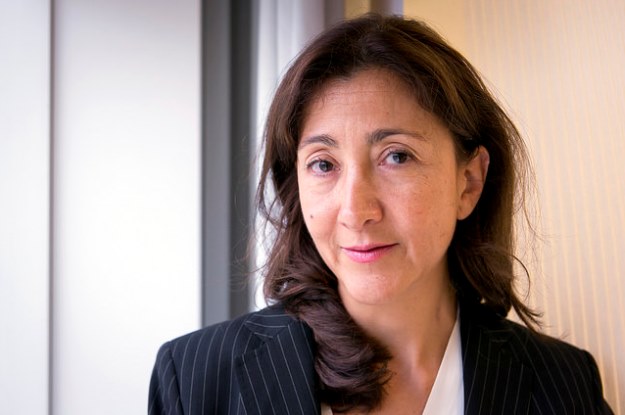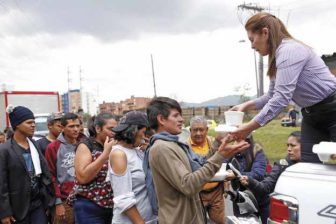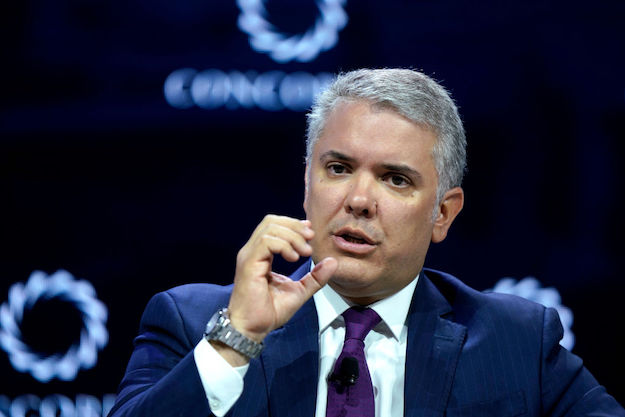Since being held captive for six years by the Revolutionary Armed Forces of Colombia (FARC), former senator and presidential candidate Ingrid Betancourt has come to believe the nation’s best path forward is through peace negotiations between the rebel group and the government.
So it is appropriate that themes of reconciliation, dialogue and forgiveness run throughout her debut novel, “The Blue Line,” published in January by Penguin Press. Set during Argentina’s Dirty War, the book is described as having “enough powerful descriptions of torture to scare a reader straight.” It also gave the Colombian-French author a new medium to discuss her experience as a jungle prisoner and her path to healing.
Betancourt, 54, currently lives between France and England, where she is earning her doctorate in theology from Oxford University. AQ spoke with her by telephone in Paris about her novel, the FARC-Colombia peace talks, and why she supports negotiations despite opposition from those such as Colombia’s former President Álvaro Uribe, who oversaw her rescue from the FARC in 2008.
Americas Quarterly: In writing this novel, did you become more convinced that Colombia’s only way forward is through reconciliation? Or was the novel a different way for you to say this?
Ingrid Betancourt: The novel has two main characters. Julia understands that in her fragility she is strong. Understanding how feeble she is, she understands that she has to let go, that she has to live in the present, that she has to be in a constructive and loving role. Theo, he has lived exactly the same way that Julia has, but he has clinged to his thirst for revenge, which is like this guilt trip he has, feeling like he is responsible for the death of his loved ones. He’s a prisoner of the past. He’s unable to forgive himself and unable to forgive others. When you see these two destinies, I think the reader must try to find the one that seems the best option. We always have two options in life. And those options that are essential are the ones that define who we are.
AQ: Are you optimistic about the Colombia-FARC peace talks?
IB: Yes, I am optimistic. I think there are still many hurdles to the successful completion of the process. I think that everything that has to do with human negotiations, when the ego gets in the way, is always very dangerous. There are things that have to be addressed that haven’t been addressed properly that could fire back in the future. So that’s a concern, but it doesn’t diminish my optimism… One of the things I’ve seen in the years since my liberation, so a span of eight years, I have seen Colombians looking at themselves in a different way. What’s happening today, the openness of many Colombians in thinking that the peace process could be achieved – and not only could be achieved but could bring good things – is something that eight years ago was just impossible. People were very resentful. The idea they had about how to solve this problem was confrontation with the FARC and alienation. There was no room for thinking that the other one could bring something positive to the equation of how to make Colombia a better place.
AQ: What created this change?
IB: I think there are a couple of new ingredients. The first is the FARC was militarily defeated. So the balance changed. People in Colombia thought perhaps the FARC was not as fierce as they seemed. The defeat of their scheme and their strategy opened the way for new leaders to push into the organization, to the high levels of the secretariat. So things changed in the way the two sides were looking at each other. The sides began negotiating and producing results. Even in Colombia, people who were thinking it wouldn’t lead to anything began changing their perception of the chance for the peace process to be successful. That’s one thing, the balance and the way people would see each other. There’s another thing, which is the leadership in both sides. One of the things that strikes me, even now, is to see how the vocabulary and tone in which both parties express their views of the other have changed from a very dubious, untrustful and aggressive kind of speech to a more respectful, and cautious, but respectful approach. I think that has an effect on all of society.
AQ: You were rescued in an army operation overseen by former right-wing president Álvaro Uribe, who today opposes the peace talks and calls it “capitulation.” Can you explain the difference in perspective between the two of you?
IB: There are many reasons. First, I don’t get any personal benefits from the war. I think people who have built political capital on the strategy of defeating the FARC don’t want to see the peace process come to completion. That’s one of the things that differentiates Uribe and myself. And I think I have been able to go through a process of reflection on what happened to me during those years of abduction and that reflection has given me the insights on how important it is to just move on. I think Álvaro Uribe doesn’t have that insight yet. I think he is still suffering a great deal as a victim. His father was killed by the FARC, and I think it’s something for him that’s still an open wound. There’s a third difference, which is I have been able to understand the fragility of humans that we all share. I think that’s something Uribe doesn’t want to see. For him, the FARC is a threat and there’s no other option than to confront the FARC. I don’t see that. I see that the FARC could still be a threat, of course, but it could also be an organization that could work in a positive way in the transformation of the country if it really does have a transition from warfare to political action.
AQ: What do you say to Colombians who might oppose the peace talks? Or to those frustrated with delays in the negotiations?
IB: One of the things that strikes me is that the people who have least suffered from the war are the ones that oppose the peace process the most. So I think there is a humbling lesson in suffering, which is that a perfect solution doesn’t exist. In that spirit of humbleness, I would say that whatever we can do today to avoid people suffering what we have suffered this generation, and to give the opportunity for our children and our grandchildren to build a better country than the one we had, that’s not only our responsibility in history but also our vocation. War is more of the dehumanizing situation we have been living for 100 years. I understand that people are afraid of change. Change is always frightening. But change is who we are. We have to evolve.
This interview has been lightly edited for length and clarity.








